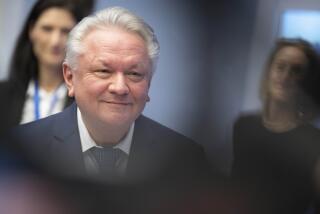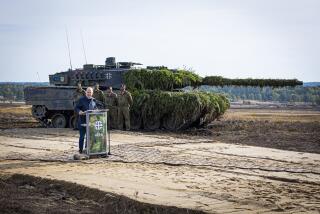German Linked to Libyan Arms Deal
- Share via
BERLIN — For the second time in less than a decade, Germans are digesting the disagreeable news that their country’s private sector has helped further Libyan leader Moammar Kadafi’s dreams of developing a chemical weapons program.
In the wake of CIA Director John M. Deutch’s testimony to a Senate panel last week that Libya is again building a poison gas factory, German authorities have revealed that they are holding a Stuttgart businessman in connection with the project.
The possibility that a German supplied poison-gas technology to a renegade leader such as Kadafi is extremely disturbing to many here. This country’s historic use of poison gas against Jews and other enemies of the Third Reich has left many Germans convinced that their society has a unique responsibility to oppose chemical weapons.
“We have another scandal,” lamented Berlin’s largest daily newspaper, the Berliner Zeitung, on Tuesday in an editorial calling for tougher measures against military-technology exports.
According to German customs spokesman Leonard Bierl, the authorities took Hans-Joachim Rose into “investigative custody” in July 1995, on suspicions that he shipped gas-purifying equipment to the factory in Libya by way of India.
Rose has remained in custody, although he has not been formally charged. German law allows prosecutors to imprison certain suspects while the state builds its case.
A second German firm, Westfalia Bekulit, of Bochum, was also revealed Tuesday to have shipped equipment for use at the Libyan plant. But German authorities have no plans to bring charges against the company because its executives made a convincing case that they thought they were supplying excavating machines for an innocuous civil-engineering project.
In fact, the machinery was apparently used to dig tunnels inside a mountain southeast of Tripoli, the Libyan capital, for what the Central Intelligence Agency says will be the world’s biggest underground chemical weapons complex. The CIA says that the plant will encompass six square miles when it is completed and that the hollowed-out mountain is already being used to stockpile Libya’s existing supply of chemical weapons.
Kadafi claims, however, that the tunnels are nothing but a huge and costly showcase project to bring ground water from beneath the Sahara Desert to irrigate the Libyan coast.
Neither Libya nor the United States has signed a 1993 United Nations convention banning the use, development or stockpiling of chemical weapons. Germany, however, was active in drafting the convention and was an early signatory.
This country was severely embarrassed in 1989 when it was reported that another German firm, Imhausen Chemie, aided Libya’s previous attempt to build a chemical weapons plant. The embarrassment intensified after the Persian Gulf War, when it became clear that German entrepreneurs had also helped with Iraq’s attempts to develop chemical and nuclear weapons.
Since then, Bonn has substantially tightened its laws controlling exports of weapons technology and has stiffened penalties for those who break them.
Bierl said it would be “unfortunate” if the reports of technology shipments to Libya left the impression that Germany is going soft on enforcement.
Still, other Germans now wonder whether the Rose revelations are a sign that German export controls are still too weak.
“I think there will be a huge discussion about this new Libyan thing,” said Goetz Neuneck, a scientific fellow at the Institute for Peace Research and Security Policy, a Hamburg think tank. “The journalists will be asking again, ‘Where are the loopholes?’ ”
Even before his detention last summer, Rose had become a familiar face to German law enforcement authorities. In March 1990, customs police seized documents at his offices on the suspicion that he was preparing to ship precision instruments to Libya.
That was just one year after the scandal over German assistance to Libya’s first chemical plant, in Rabta, which Kadafi said was a pharmaceuticals factory. That plant was destroyed by a fire in 1990.
More to Read
Sign up for Essential California
The most important California stories and recommendations in your inbox every morning.
You may occasionally receive promotional content from the Los Angeles Times.













